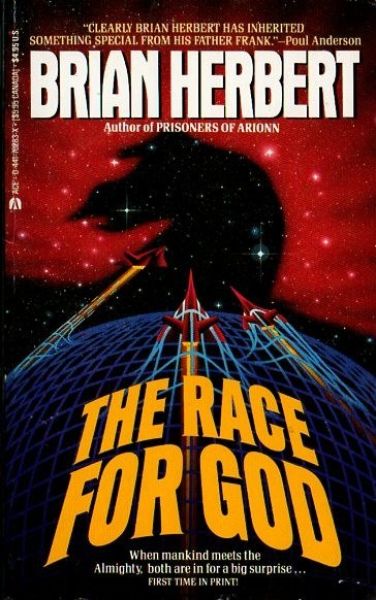Silver Spoon In Hand
The Race For God
By Brian Herbert

25 Apr, 2024
Brian Herbert’s 1990 The Race for God is a stand-alone science fiction novel. (One was more than enough!) It is the third novel to be featured in my What’s The Worst That Could Happen? Series of reviews. Readers may question whether Brian Herbert has earned his place in SF history. I can assure them he has earned his spot in this project, a tour of SFF’s worst1.
Grand Exalted Rooster McMurtrey founded the Interplanetary Church of Cosmic Chickenhood more or less as a joke. But then God decided to speak through McMurtrey — according to McMurtrey.
Although God is notorious for obscure proclamations and for extended silence, this time God deigns to provide listeners with concrete evidence. God supplies his home address, the planet Tananius-Ofo in the (very2) distant galaxy 722C12009. God is also thoughtful enough to manifest a fleet of starships able to swiftly cross that expanse.
McMurtrey’s home world D’Urth abounds with a multitude of faiths, off-brand knock-offs of religions familiar to terrestrial readers. Thousands flock to the ships, eager to meet God. Passage on the fleet is not restricted to any one creed.
Although the divinely created ships are very fast, passage to Tananius-Ofo is not instant. Time for McMurtrey and his fellow traveler to wrestle with deep philosophical questions:
- How about that God fellow?
- Why are God’s representatives on McMurtrey’s ship a grumpy robot and an inarticulate computer?
- If there’s one God, why the diversity of creeds?
- If the trip to Tananius-Ofo is a race, what does the winner win?
- Can even terrible sinners repent?
- How is it that homicidal cyberoo Jin can slaughter his way through McMurtrey’s ship without being impeded by the ship’s security systems?
- Just how awesome are Kelly Corona’s breasts?
Answers wait on God’s home world. Well, except for that last question, which McMurtrey answers during the trip.
~oOo~
Another important philosophical question readers may wrestle with is “how the heck did this garbage see print?” The answer is “the author picked his father wisely.” Brian Herbert is, of course, famed author Frank Herbert’s son. Some families produce generation after generation of talented writers. The Herberts were not one such. Brian Herbert is a living example of the concept “regression to the mean.” However, he does have one legitimate talent, which is capitalizing on that famous surname.
I am reasonably certain at least part of this novel was intended as humour. The joke-like objects may superficially resemble humour, but they aren’t funny.
It’s hard to believe just how thoroughly Brian Herbert’s novel failed to meet the minimal standards of an often-undemanding genre. The world-building is perfunctory. The characters are paper-thin. The prose is unworthy of an untalented highschooler. The author’s grasp of science is rudimentary. The philosophical musings and religious zingers targeted at thinly disguised real-world creeds are puerile. The ultimate answers to life, the universe and everything might have been cribbed from Midnight at the Well of Souls fanfic found in a dismal corner of AO3. Worst of all, the novel is dreadfully boring.
Astonishingly, while God is utterly terrible, it’s not the worst SFF book I’ve ever read. It’s not even the worst Brian Herbert novel I’ve read. That would be The Little Green Book of Chairman Rahma, which I read April 25, 2014, exactly ten years ago. I’ve often celebrated the anniversary of my final Brian Herbert novel; now I get to restart that clock.
There is one bright side to my experience of this Herbert novel and of Brian Herbert novels in general: reading Brian Herbert’s terrible, terrible books makes me appreciate Christopher Tolkien’s self-restraint and sensible curation of his father’s work.
The Race for God is available here (Amazon US), here (Amazon Canada), here (Amazon UK), and here (Barnes & Noble). I did not find it at Apple Books, Chapters-Indigo (or Kobo), or at Words Worth Books. Good for them.
1: What’s The Worst That Could Happen? also covers particularly challenging but worthy texts such as Gravity’s Rainbow. However, the only difficult aspect of Herbert’s book was resisting the urge to stare directly at the eclipse long enough to free me from the obligation to read the novel. Its inclusion is entirely because God is terrible.
2: As in trillions of parsecs away meaning of distant.
